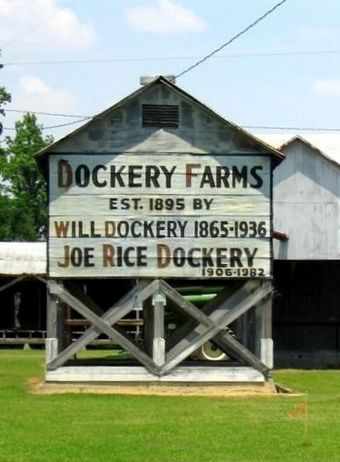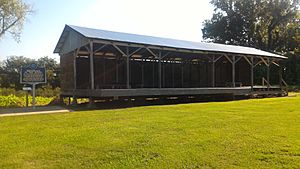Dockery Plantation facts for kids
Quick facts for kids |
|
|
Dockery Farms Historic District
|
|

Dockery Farms in 2005
|
|
| Nearest city | Dockery, Mississippi |
|---|---|
| Area | 6 acres (2.4 ha) |
| Built | 1930 |
| NRHP reference No. | 06000250 |
| Added to NRHP | March 31, 2006 |
Dockery Plantation was a very large cotton farm and sawmill in Dockery, Mississippi. It was located on the Sunflower River between Ruleville and Cleveland, Mississippi. Many people believe it's where Delta blues music first started. Famous blues musicians like Charley Patton, Robert Johnson, and Howlin' Wolf lived and played music here. This historic place was added to the National Register of Historic Places in 2006.
Contents
The Story of Dockery Farms
Will Dockery (1865–1936) started the farm in 1895. He bought the land for its trees, but soon saw that the soil was great for growing crops. Back then, much of the Mississippi Delta was wild. It had many cypress and gum trees. Wild animals like panthers and wolves lived there.
The land was slowly cleared and drained. This made it ready for growing cotton. Many black workers came to the area. Some became sharecroppers. This meant they worked a part of the land. In return, they got a share of the crops grown. Other workers moved around often. Will Dockery was known for treating his workers fairly. This helped him attract workers from all over the South.
Connecting to the World
Dockery's farm was quite far away from towns. But a new train line helped connect it. This line was part of the Yazoo and Mississippi Valley Railroad. It was known as the "Yellow Dog". Around 1900, Dockery built a train station on his farm. This connected his land to the main train system at Rosedale. This local train line was called the "Pea Vine" because of its winding path.
Life at Dockery Plantation
Dockery Plantation grew to support over 2,000 workers. They were paid with special coins made by the plantation itself. The farm had its own general store, post office, school, and churches. There was even a doctor.
Workers lived in boardinghouses. Here, they spent time together and played music. Guitars became very popular. Mexican workers had brought guitars to the area in the 1890s. Will Dockery didn't care much about the music. But he made it easy for his workers to travel and enjoy their free time.
The Birthplace of Blues Music
Charley Patton and his family likely moved to Dockery Plantation around 1900. There, he learned from an older musician named Henry Sloan. Patton then became a key figure for many blues musicians. This group included Willie Brown, Tommy Johnson, and Eddie "Son" House. They played music all around the local area.
Dockery Plantation was in the center of Sunflower County. About 35,000 black people lived there in 1920. Because of this, the farm became a famous place for informal music. By the mid-1920s, younger musicians joined the group. These included Robert Johnson, Chester "Howlin’ Wolf" Burnett, Roebuck "Pops" Staples, and David "Honeyboy" Edwards. Some of these musicians traveled a lot. Others lived on the farms more permanently.
Dockery Today
In 1936, Joe Rice Dockery (1906–1982) took over the farm. Over time, machines started doing more farm work. Also, many people moved to bigger cities in the North for jobs. Because of this, the old farm settlements slowly disappeared. However, some of the historic buildings are still there.
The farm later started growing other crops. These included corn, rice, and soybeans. Later members of the Dockery family created a foundation. This foundation helps fund research about the Delta blues.
The property was added to the National Register of Historic Places in 2006. Today, the site offers special tours, talks, and events. They work with groups like the Thelonious Monk Institute of Jazz and Delta State University.
Mississippi Blues Trail Marker

A special marker at Dockery Plantation shows its importance. It is part of the Mississippi Blues Trail. This trail recognizes places that helped create the blues music in Mississippi.
The marker was placed in Cleveland, Mississippi. Governor Haley Barbour said:
I’m pleased to include Dockery Plantation on the Mississippi Blues Trail. Apart from the town’s unique historical legacy, which includes printing its own money, Dockery was home to famed bluesman Charley Patton and played a significant role in the development of the Delta blues.
 | Bessie Coleman |
 | Spann Watson |
 | Jill E. Brown |
 | Sherman W. White |



